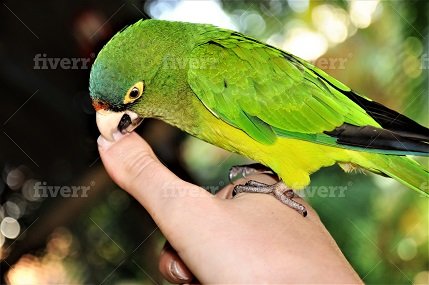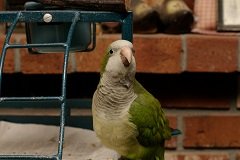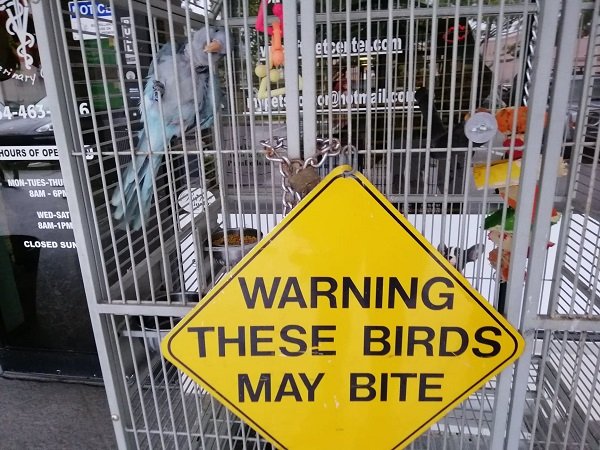Quaker parrot is brilliant species and learns activities and behavior from their surroundings pretty quickly. In the wild, they use their beaks to examine different surfaces, to climb and maintain balance by grasping things, and to satisfy their hunger pangs.
Along with their claws, they use their beaks the way we use our hands. It is their natural instinct to explore things by touching their beak with the surfaces they are exposed to. When we domesticate quaker parrots, they still have the same qualities but bring them into use in a different manner.

Quaker parrots are exploring their new surrounding with beak
When you bring home a baby quaker, he will mouth everything just the way human babies do. You need to educate him about the things that are safe to bite and the ones that are dangerous. If you don’t teach him that during his early years, he will not be able to distinguish between bite-able and non-bite-able things when he grows up. He will destroy all your household items and might even harm himself by biting an electrical wire.
Also because it sometimes it is really hard to control where our bird is when it is flying freely around the apartment best thing is to hide and isolate household items that could hurt Quaker Parrot.
Remove electricity wires from places he often spends time outside. Also isolate and turn off any heat-producing appliances, like stove or heaters.
Reasons for quaker parrot biting habits:
Just harmless habit of exploring surroundings
Most of the new parrot parents complain about their pet biting them. It is very much normal in all the parrot species to show such behavior. There are numerous reasons behind such biting behaviors shown by quaker parrots. In case your pet parrot is very small when you brought him home, you might have inculcated biting habit in him accidentally.
The way our human babies hold our hands when we extend ours towards them, our baby birds also try to hold our hands with their beaks.
If we abruptly remove our hand away from them out of fear, they will try to hold the hand faster the next time you extend it towards them. This way they might bite you while trying to get hold of your hand.
To avoid such circumstances, you can cover your hand with a towel whenever you extend your hand towards your little one. Once you have trained him enough to step-up onto your hand rather than to hold it with his beak, you can extend a bare hand towards him.
Biting from fear:
The other reason for your pet biting you could be his fear and anxiety when you enter into his personal space. It is a gesture shown by him to shoo you away from his surroundings.
You will experience this in the early days of your quaker’s training. This anxiety and fear will die down slowly when he will start seeing you as a friend rather than a predator.

Quaker Parrots in the cage is protecting his property
Quaker parrots originate from Argentina. Parrots in the wild, are very protective of the huge territories they build for themselves. At our homes, their behavior is no different. Your pet parrot will try to protect his cage and his belongings by any means, even if that forces him to bite you. If you are experiencing biting from your pet while replacing his food dishes or his toys, it is very much normal on his part.
To prevent bites during such activities, you will need to attract your little one’s attention to something out of the cage. It could be a food treat or a colorful toy he can get engaged with for a little while You can, then, easily carry out the task of cleaning his cage, replacing his containers and introduce new toys into his cage.
Getting your Quaker parrot attention
When you have already developed a bond with your little bird, he might also bite you to dominate you for some reason. The way human babies make unreasonable demands, baby birds can also go to that extent.
Your quaker might be demanding more of your time or immediate attention. In such cases, do not ever shout or scream on your pet parrot as it will reassure him positively that he is getting what he wants i.e. your attention.
He will continue to bite you to get more of your time and attention. You just need to ignore this bite to make him feel that this behavior will not be answered by you in any manner. It will deter him to bite you again as he will start feeling his biting behavior to be useless.
Biting while grooming
Your parrot might bite you during his grooming sessions to avoid getting his nails or feather clipped or to avoid adjustment of his beak length. He feels uncomfortable while getting the grooming done.
To make him feel comfortable, you can start cutting your nails first and continue with his later. Take him to the bath so that he enjoys your company and doesn’t pay much attention to the water drooling over his body.
Play the towel game with him while drying him up. He loves to hide and also loves to find a way out to you from the towel. Make the grooming sessions fun-filled and you will never face any biting issues during grooming ever.
Biting while playing
There are chances of your little one biting you while you are playing with him. It is out of over-excitement born from the positive experiences he is getting from the game.
Deter this behavior again by ignoring these bites and carrying on with the game you are playing. As a parrot owner, start building a habit of controlling your natural instinct to shout when he bites you. It will be of great help in developing good behavior in your baby.

Research reasons behind Quaker parrot biting you
Please always carefully examine the reason behind your quaker parrot biting you, as he might be facing some medical issues too. Biting is not always unnecessary, your little pet can use it to inform you about something important.
The possibility of developing a disease requiring medical attention increases, especially when you observe any radical shift in his behavior. Get him thoroughly examined from the avian veterinary to address the real concern.
Kids and interacting with Quaker parrot
If you have children living at your home, take special care while they interact with your little pet. Your work of maintaining discipline doubles-up here. You need to educate your children not to bully any pet, and instead inculcate values in them in a way that they love pets and are compassionate towards them.
On the other hand, you also need to ensure that your pet quaker doesn’t misbehave with your children by biting them. At first, introduce them from a distance and after your pet becomes comfortable around your children, you can allow your child to extend his hand towards the parrot while being wrapped in a towel. This way, even if your baby parrot bites your child, his soft skin won’t get wounded by the parrot’s beak.
If you have guests and you want to introduce them to your baby parrot, beware of his biting behavior in advance and instruct them not to react in an abrupt manner. An interesting way of such a meeting could be your guests singing his favorite song softly from a distance. It will attract his attention towards them and he will feel a familiarity towards them due to the song they are singing.
Quaker parrot with biting habit and new bird
If you are planning to introduce your parrot to a new bird, maintain a distance between them sufficient enough to protect the new bird from biting behavior shown by your pet.
Your little pet actually gets nervous when he gets introduced to a stranger, whether it be a human or a bird. Consider placing the cages of both of your birds closer only after they have developed a strong bond of friendship between them, else they could harm each other physically.
Correcting biting behavior
You can correct biting behavior in your pet parrot by involving him in interactive exercises like a finger and step-ups, stick step-up or an extremely interesting towel game. These exercises will prepare him for the times to come as well as help him in his physical and mental growth.
In cases where you have brought home a younger parrot rather than a baby, you may need to correct an already developed biting behavior in him. These corrective measures can also be used in the case of rescued parrots.
Try not to remove your hand abruptly when you receive a bite from your pet. Also, ensure not to scream or use a cuss word when you are bitten by him.
Rather, speak softly in an assertive tone telling him not to bite. It is your intention, not your words, that will be felt by your pet baby. Calm him down and assure him that he is safe with you. Give him some alone time to get comfortable and start dealing with his biting issue again after 8-10 minutes.
Read more about how to train your Quaker parrot.
If you delay, you will have to start all over the process again. Your parrot is a little grown-up one and has his own different past to ponder upon. He might forget you soon, so be very frequent in your training and comforting sessions with mature parrots.
After a few days of multiple training sessions daily, you will start observing a difference in his biting behavior. Please don’t give up on your parrot as some parrots take longer to correct than others. It all depends on the experiences they had in the past.
If you get a wound from your parrot’s bite, don’t ignore it as it may worsen later on. Get proper medical examination done for the wound and treat it accordingly. Parrot bites are, no doubt, very painful but all the pain vanishes when you see your parrot healthy and happy around you.
The useful video I found on Youtube about this topic you may find interesting to watch.
Read more about Quaker Parrot Behaviour
https://parrotquaker.com/quaker-parrot-behaviour/




